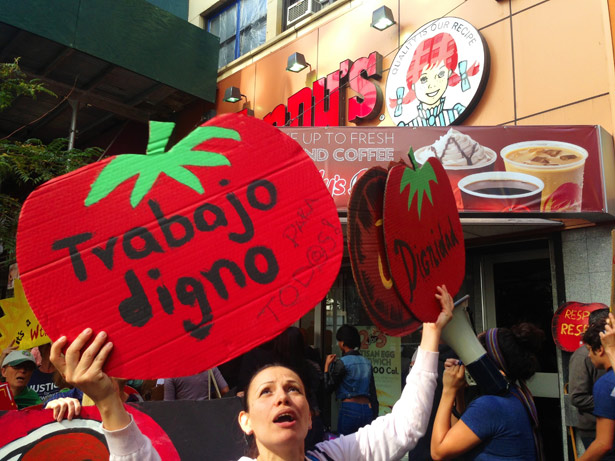
Protest by the Coalition of Imokalee Workers outside a Wendy’s restaurant in New York. (Credit: Aaron Cantú)
On October 15, a dense throng of immigrant farm workers and their activist allies packed the sidewalk in front of a Wendy’s fast-food restaurant in New York City’s Union Square, filling the air with righteous cries for justice and waving tomato-shaped signs inscribed with words like “DIGNIDAD,” “FAIR FOOD,” and “ONE MORE PENNY.” Only ten feet away, a stone-faced corporate executive stood by the building’s entrance, grumbling as he quickly opened and shut the door for baffled patrons. The members of the Coalition of Immokalee Workers (CIW) had just arrived in the city from Immokalee, Florida, and were gathered to pressure Wendy’s to sign on to CIW’s Fair Food Program (FFP), an initiative that ensures fast-food chains purchase tomatoes from ethical produce suppliers.
The CIW is a farmworker-based human rights organization that has campaigned on behalf of tomato pickers in Florida for the last twenty years. For decades before the organization’s founding, farmer-worker relations in the area resembled the owner-slave dynamic of the antebellum South, with gutter-level wages, calculated indebtedness, violent reprimands and sexual abuse defining the work lives of the mostly migrant, invariably illiterate farmhands. Such exploitation is firmly against the law, and some farm labor bosses in Florida have been convicted of rights violations in the last decade, but many were insulated from prosecution because this power dynamic intimidated laborers from coming forward. Agricultural enslavement still occurs in parts of Florida, but the actions of the CIW have made it an increasingly rare occurrence in the state.
By using a multi-pronged strategy of educating farmhands, befriending powerful allies and securing pacts with top purchasers of Florida tomatoes, the CIW is the first grassroots organization that uses worker-designed mechanisms to end the modern agricultural-slavery complex. The Fair Food Program that the workers hope to pressure Wendy’s to sign on to has been their most successful campaign to date. The group leverages the massive purchasing power of fast-food behemoths to its advantage by tying corporate profits to fair labor practices. Four of the top fast-food chains already participate in this initiative, wherein the restaurants are legally bound to purchase tomatoes from produce suppliers who adhere to a strict Code of Conduct that abolishes all forms of human abuse. Additionally, the corporations are mandated to pay an additional penny for every pound of tomatoes picked by workers, who capture the increased costs in the form of a weekly bonus. Most effectively of all, the CIW has obliterated the impunity enjoyed by abusive bosses by establishing a fanged channel through which workers can file grievances: if a tomato picker ever voices to auditors that his or her employer is not meeting any of the FFP’s stipulations, the fast-food corporation must cease purchasing tomatoes from the offending tomato supplier, lest they risk breaching their legal contract.
Predictably, companies joined the FFP only after an extraordinary amount of public pressure to do so. Taco Bell and its parent company, Yum Brands, were the first reluctant participants, followed by McDonald’s, who attempted to weasel out of the agreement by substituting the CIW’s worker-protection apparatus with its own less stringent initiative. It eventually relented, as did Burger King and Subway. Wendy’s, however, has steadfastly refused to join its competitors in signing on to the FFP, insisting that current working conditions on Florida tomato farms are fine as they are. This means the company has no legal incentive to avoid purchasing produce from suppliers who abuse their tomato pickers.
This is partially why CIW has come to New York—to demand that Wendy’s sign on to the FFP and accept the standards of decency determined by laborers. “We’re here because Wendy’s has not given us a clear answer of what their position is on worker’s rights,” explained Nely Rodriguez, a protesting member of the CIW, amid chanting voices and the banging percussion sounds. “We’ve already spent two years writing letters and hosting events, and we’ve still yet to receive an answer. We want to know: Why doesn’t Wendy’s want to join the other [fast-food companies]?”
Other farmworker associations from across the world joined the Immokalee Coalition in its protest, including a Haitian seed sovereignty group who successfully campaigned to keep agribusiness conglomerate Monsanto’s mutant corn seeds out of their country. The growing international support for the CIW has culminated in it winning the Roosevelt Institute’s prestigious 2013 Freedom from Want Medal, an honor that recognizes its members’ role in “addressing decades-old farm labor abuses at the heart of the nation’s trillion-dollar food industry.” The organization received the medal shortly after carrying out the Wendy’s demonstration.
Though change on the farm may entail a great deal of kicking and screaming on the part of the penny-scrounging food industry, the persistence of the CIW has repeatedly illustrated how the power of organized resistance can force even the most loath corporations to play by worker’s rules. The currents of change clearly favor the laborers of Immokalee, and the longer Wendy’s resists the coalition’s demands, the further it will forsake its public image and alienate its consumer base, as the chorus for justice grows louder and bolder.
Read Gar Alperovitz on how to democratize the US economy.


